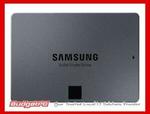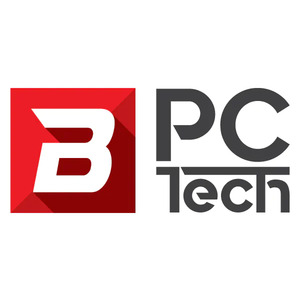4-bit MLC technology delivers fast read/write speeds of 550/520 MB/s*
V-NAND reliability backed by up to 3-year or 360 TBW warranty
Samsung 860 QVO 1TB SATA III 2.5 SSD $156.60 + Delivery @ Budget PC eBay
Last edited 08/02/2019 - 20:17 by 1 other user
Related Stores
closed Comments

Pros
- Decent endurance for a QLC SSD
- Build quality
- AES 256-bit encryption with Windows BitLocker support
Cons
- High introductory RRP
- Write performance after SLC cache exhausts
- Three-year warranty
Samsung 860 QVO delivers acceptable performance, high capacity, and enough endurance to satisfy most users. The Intelligent TurboWrite cache eventually fills during large file transfers, which slows performance. But it's hard to recommend the 860 QVO if it isn't retailing at least 10% below the other mainstream TLC SSDs.

how is a 3 year warranty a con lol

their mainline SSDs are 5 years

That was a quote from the review and not my opinion.
I guess at the time of the review the QVO's prices were comparable to mainstream TLC SSDs which come with 5-year warranties, and so it was a negative because for about the same price you buy less performance and less warranty. Obviously it is now a lesser con as QVO's prices come down.

Yeh its not exactly a con lol
Guessing they meant another possible reason why you would choose the 860 EVO (or other SSDs) over it… Having a 5yr warranty, better performance, similar price etc.

@[Deactivated]: The con is the shorted life as far as total writes. It's dependant on your use as to how significant that would be. The total write life is half of the 860 evo 1tb. I use a 256gb for video editing, It's really harsh on SSD, & I exeed life writes in 2 years. I say that because many people laugh at total writes, as if that's never possible.

@AlexF: Yeah, I run a 6 HDD RAID for video editing, but he might be on a laptop.
10GB or TB3 NAS Boxes solve the speed limitation.

Samsung 860 QVO is not even close to the Samsung 860 EVO

yeah its like 1 letter off. pretty close

Is this better than the existing budget drives like the A400 & BX500 etc?
This kind of almost seems too good to be true, there has to be a huge compromise with this drive vs other budget drives.
This would still be far better than your typical budget SSD.

Is this better than the existing budget drives like the A400 & BX500 etc?
Yes much better, it's close to the previous 850 model as far as speed.
This kind of almost seems too good to be true
The new type of NAND is cheaper at the cost of endurance. Very few consumers get anywhere close the the endurance limits though so in a sense the previous type of NAND was too expensive to be suitable for most users.

There is some compromise, especially for the 1TB version (compared to the 2TB and 4TB).
Samsung uses something called intelligent turbo write. Basically, it has a default turbo write of 6GB (SLC cache). However, knowing that with just 6GB SLC cache, a lot of tests would expose its weakness, especially with heavy read/write tests. Thus, it uses dynamic turbo write and allows up to 42GB turbo write for 1TB. Once exhausted, the actual native QLC write speed drops to 80MB/s. Basically, if you do a full SSD clone, you will be able to see its ugly side, but how often would you clone a 1TB SSD to this?
For 2TB/4TB versions, the intelligent turbo write goes up to max of 78GB and actual native QLC write speed is 160MB/s (due to more cells available to write concurrently).
Because of the generous intelligent turbo write, in most cases, you won't be able to notice the drop. Or, if you want to look at it in a crude way, Samsung have come up with a way where most tests won't be able to stress the QLC SSD hard enough to expose its ugly side.
The reason why this drive appears to have better benchmark than BX500 for example is because BX500 is a severe cost cutting TLC SSD so it only has a tiny SLC cache (and from memory BX500 is DRAMless) so its true / sub-par TLC NAND speed gets exposed quite quickly.
My only concern is that Samsung's track record on their first gen TLC (planar) and NVMe SSDs wasn't great (both had higher than usual failure rate, with 840 / 840 EVO having the infamous old data read slow down problem). Sure, their second gen ones really shined. Is it worth embarking on this first gen QLC SSD? And, the price is not that low (probably due to quite generous SLC cache, compared to traditional TLC SSDs).

does this samsung one have dram?
sounds like the 2-4tb versions are quite worth it if the lowest is only 160mbs which isnt amazing for SSD, but faster than HDDs still
as for the 80mbs write speed. i assume read speed is still fast
so if you buy it as a game install drive its great value then?

860 QVO has DRAM (at this price, it isn't exactly that cheap). Read is not an issue.
If it is for gaming, it is certainly fine. Read is certainly still SSD class. Write is generally fine for games as well. If the source device isn't a decent SSD, it won't be able to pump out data fast enough. So, if your source drive is a traditional hard drive, turbo write cache won't exhaust that quick. And, if we are talking about downloading games from Steam / Microsoft / Sony, then that's not even an issue at all (100Mb/s NBN is merely 12.5 MB/s). Besides, you spend more time playing games (read) than installing games (write). As long as it is an SSD, you will generally get the good performance gain.
You see a lot people getting dirt cheap SSDs (no name brand ones, even DRAMless ones) for gaming - that makes sense.

What, only 3 years warranty? Tri-cell 860's come with 5 years!

Quad cell SSDs are slower and less durable than Triple cells.
Multiple (two) cells are the fastest and most durable, i.e. Samsung pro

I used to prefer MLC and still use a 1TB 970 Pro as a boot drive, but given my workload (video editing) purchased my first TLC drive last year and have been very happy with it. Mind you, that Intel TLC drive (SSDPEDKE020T701) has a ~11PBW (not TBW) endurance rating so I'm hoping it will last for some time.

Sure, there are TLC drives better than MLC drives, but in general, and on similar processes SLC > MLC > TLC > QLC.

@BenR31415: Basically, most of the mainstream SSDs employ two different NAND writing methods:
MLC: SLC + MLC
TLC: SLC + TLC
QLC: SLC + QLCAnd, smarter techniques are being used by manufacturers to temporary maximise SLC cache (or the way to write a NAND cell). Furthermore, with the improvements done to the controller, and in most cases, we spend more time on reads than writes for SSD, these TLC and QLC SSDs are getting attractive / more competitive.
I found TBW rating not a good indicator of the longevity of SSDs. I had 4 SSDs died so far, none of them had > 2TBW. My Samsung 840 SSD had less than 1.3 TBW and still died within a year.

@netsurfer: Conversely I had 24 512gb Samsung 860evos (maybe 850s?). And not one failed with 48TBW.
(Only a couple had more than 1 reallocated fully bad sector)
So… Ymmv and your RNG might suck.

New to these so please excuse the ignorance,
Can these be used externally with USB 3.0/C? What other components will I need to source?
Would appreciate the help! :)

Yes in theory but USB 3 SSD enclosures are really bad as far as speed and reliabilty. I think it makes more sense to buy a portable SSD such as Samsung T3 or T5 which usually works fast.
If you want to try an enclosure though you want a USB 3.1/3.2 or Type C with UASP controller. They start at $14 (MSY)

Only $14? Which one is that? :) The last type-c 3.1 enclosure I got was $50 :/

I wouldn't bother with an enclosure at all to be honest. Just use a sata - usb cable.

Performance of a T5 isn't stellar if you considered it is meant to be a USB 3.1 gen 2 SSD. Its performance barely passes SATA3 speed in sequential and the random read/write performance is below native SATA3 (if you compared to 850 EVO for example). Then, you look at the interface conversion cost - which means its access time is below native SATA3.
Don't get hyped up by the theoretical maximum speed of USB 3.1 gen 2, what's actually inside counts. What's inside of a T5 doesn't beat 850 EVO especially when it comes to random read/write. Honestly, if I have a really fast SSD, I'd rather take full advantage of it, rather than put it in an enclosure. Far too many devices I have only have USB 3.1 gen 1 and for my Thuderbolt 3 devices, USB 3.1 gen 2 isn't impressive anyway.

Yes. A case off eBay for less than $10
Search for 2.5" hard drive enclosure.
Basically just insert it and you're good to go.

When purchasing a USB 3.0 hdd/ssd enclosure, make sure you check what speeds it's capable of. You may end up throttling the ssd.
I have an old enclosure that only gets half the speed of the ssd I have inside it.

The Orico USB3.0 SATA cases are quite popular; I've bought a handful via OzBargain. I'm pretty sure they're UASP (i.e. faster speeds with SSDs) too. Last one cost me $9 delivered that's still empty as a spare.
@Dijhi1 It doesn't really matter if the CASE is unreliable… you can always swap it out which you can't do with an integrated drive. The Western Digital portable HDDs were a problem as the USB port was integrated on the primary board, unlike the Seagate HDDs, which means a damaged USB port = dead drive.

I just a USB enclosure. It’s giving me 110MB per sec. using Samsung data migration tool. Is this normal speed ?

That's pretty close to what I get with an internal SATA port on my 860 Evo, so I'd be quite happy with that!

@Switchblade88: Err really ? I thought ssd were suppose to be much faster than my 10yr old wd black caviar

Buying USB 3.0 Orico enclosures is like buying lottery, you get really good chipsets at times and you get really lousy chipsets most of the time. You don't necessary get better ones if you purchase them more recent and the price isn't a good indicator of the chipset you will get.
My second last batch of Orico enclosures support UASP so I thought it would be safe to buy them again (from the same seller). However, the latest batch had a very old and lousy chipset.

Try to go for one with TRIM support. I'm using [these](https://www.amazon.com.au/gp/product/B00XLAZODE but they need a firmware update for TRIM support. StarTech also makes enclosures with TRIM.
I suppose you can find similar from other brands, but I haven't had much luck. Let me know if you find one! StarTech has a list here, and it looks like Plugable has some too.
Oh, it'll work without TRIM, just possibly not as well, especially as it ages. Especially with QLC that depends heavily on a shrinking dynamic cache (without TRIM to tell the drive which pages can be cleared).
trimcheck can be used to test an adapter.

Found this Sata III USB adaptor to work well
https://www.ebay.com.au/itm/USB-3-0-to-SATA-2-5-Hard-Drive-H…

1440TBW is for 4TB model . this 1T one only has 360TBW

Corrected. Thanks for noticing.

1TB model must be made with much lower quality NAND.

Think you'll find 4 x capacity has 4 times the TBW. Not necessarily lower quality NAND

this fit ps4 pro?

SATA III, so yea. Not much of speed increase but load faster still.

Cheers OP! Bought :)

are you happy with your purchase? did it arrive soon after you bought it? I actually went in store and paid a little more ($169) to get it immediately the day I saw this deal. The guy in store said they had received many orders.

Very happy. Fast enough to load games in a jiffy.
Arrived 6 days after I ordered.

this or 860 EVO?

Yes

Yes, what?

that

860 evo better

Definitely the EVO. The EVO has faster write, longer life, only $60 more.
The main reason to get QVO is for budget builds. QVO is still better than HDD.

Cheap

After reading all these comments, this doesn't seem to be that cheap. I thought it almost match the EVO!

I just want something for a steam library directory. This would be fine, right?

Yes it would be fine.
The downside of the QVO vs EVO are lower write speed an lower write durability. Those are not issues for a steam library.

I doubt most would notice the difference, or hit the caps, in everyday use. For years.

I agree. My 850 EVO has only 16 TBW after 2.5 years. However, if I was buying today, I would still pay $30 extra and get the 960 EVO, for peace of mind (for my system boot drive).

This Samsung 860 QVO or Intel 525s SSD, which is better if I am looking at reliability (speed/performance not as important)?

This for $161 delivered, or the Samsung 860 Evo for $195 delivered?

Where/how do you get Samsung 860 EVO $195 delivered?

Shopping Express has a sale on the QVO and EVO lines
https://www.shoppingexpress.com.au/samsung-ssd-sale-060219?s…

Cheaper on ebay using futu (even with their pricejacking …)
https://www.ebay.com.au/itm/Samsung-SSD-860-EVO-250GB-500GB-…
1TB 860 EVO
AU $239.00 down to 191.20 with passionate code.With only $30 difference, grabbing another 2 to make the gaming raid array complete on my desktop (8x 1tb)

The QVO is mainly for absolute budget builds or a quick replacement for a hdd for low power users.
If you want to make a system and save as much money go QVO.
If you want to make a system with longer lifespan, higher write speed and higher write durability go EVO.

This is basically trash compared to the 860 evo we got for the same price 3 months ago. Bargain guys!

100% FACT … check out those benchmarks.. not only is it slower by almost 50% but its less durable and that means less reliable.
Until this things 50% cheaper its pointless.






Review